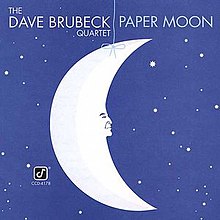
Desert Lady / Fantasy is the fourth recording released by the Toshiko Akiyoshi Jazz Orchestra featuring Lew Tabackin. Not to be confused with the 1989 Lew Tabackin (Quartet) Concord Records release, Desert Lady. The album received two Grammy award nominations in the "Best Large Jazz Ensemble Performance" and "Best Arrangement on an Instrumental" categories.
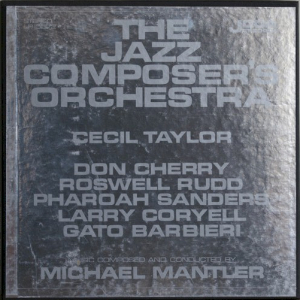
The Jazz Composer's Orchestra is a 1968 album by the Jazz Composer's Orchestra recorded over a period of six months with Michael Mantler as composer, leader and producer. Many of the key figures in avant-garde jazz from the time contributed on the album including Don Cherry, Pharoah Sanders, Gato Barbieri, Larry Coryell, Roswell Rudd, and Carla Bley. The album's finale features a two-part concerto for Cecil Taylor and orchestra.

Miles & Quincy: Live at Montreux is a collaborative live album by American jazz trumpeter Miles Davis and conductor Quincy Jones. It was recorded at the 1991 Montreux Jazz Festival and released by Warner Bros. Records in 1993.

Jerry Bergonzi is an American jazz tenor saxophonist, composer, and educator.

Tritonis is a 1980 album by the Dave Brubeck Quartet.

Jazz Casual - The Thad Jones / Mel Lewis Jazz Orchestra, Woody Herman and his Swinging Herd consists of a recording of a Woody Herman and his Swinging Herd appearance from 1963 and a Thad Jones / Mel Lewis Jazz Orchestra appearance from 1968 that were combined and released as a single DVD video and also as an audio CD. Jazz Casual was a KQED-produced television show of studio performances by major jazz musicians. The same material has also been released in different packages
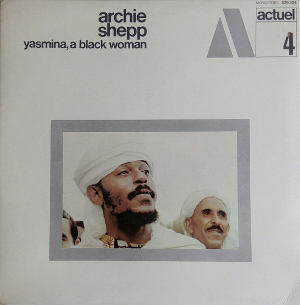
Yasmina, a Black Woman is a jazz album by Archie Shepp, recorded in 1969 in Paris for BYG Actuel. It features musicians from the Art Ensemble of Chicago. The first track, giving its title to the album, is a long free jazz piece by an 11-piece orchestra; in it, the references to Africa that Shepp had experimented with only a few weeks earlier in Algiers are to be found in the use of African percussion instruments, or the African incantations sung by Shepp himself at the beginning of the track. The other two pieces, a homage to Sonny Rollins written by trombonist Grachan Moncur III and a standard, played by a more traditional quintet and quartet respectively, are more reminiscent of the hard bop genre, although the fiery playing of the musicians, notably Shepp himself, gives them a definite avant-garde edge. It was originally issued on CD by Affinity, mastered from an incredibly noisy vinyl source and later reissued by Charly from the original master tapes.

Big Band and Quartet in Concert is the fifth album Thelonious Monk released for Columbia Records, featuring several Monk compositions. It was recorded live at Lincoln Center, Philharmonic Hall, New York, New York on December 30, 1963. Like the earlier The Thelonious Monk Orchestra at Town Hall album, the large ensemble pieces were arranged by Hall Overton. The large ensemble featured 10 musicians, including the four members of the Thelonious Monk Quartet and six additional brass and reed players.

Jazz at Oberlin is a live album by the Dave Brubeck Quartet. It was recorded in the Finney Chapel at Oberlin College in March 1953, and released on Fantasy Records as F 3245. The Fantasy Records album back cover states that drummer Lloyd Davis had a 103-degree fever during the performance.
Young Lions & Old Tigers is a 1995 studio album by American jazz pianist Dave Brubeck.
To Hope! A Celebration is a 1996 live album by the American jazz pianist Dave Brubeck.

London Flat, London Sharp is an album by Dave Brubeck. It was recorded in 2004 and contains quartet performances of new and previously recorded pieces, most of which were written by Brubeck.
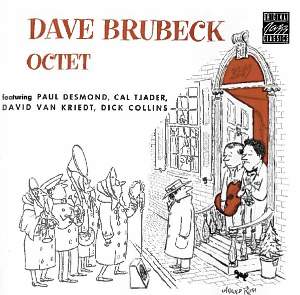
The Dave Brubeck Octet is a jazz album released by The Dave Brubeck Octet in 1956. It compiles the octet's complete recorded output made between 1946 and 1950, which was originally released in other forms. The artwork was credited to Arnold Roth.

Big Boss Band is the 1990 studio album of George Benson on Warner Bros. featuring the Count Basie Orchestra. This is Benson's second consecutive album which returns to his jazz roots after his successful pop career in the 1980s, and also his debut as sole producer of an album. The genre is mainly big band swing with some Michel Legrand and R&B thrown in.
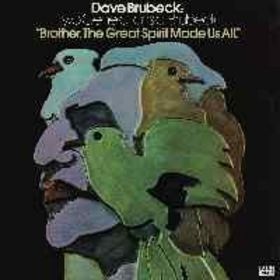
Brother, the Great Spirit Made Us All is a 1974 studio album by Dave Brubeck accompanied by his sons Darius, Chris and Dan.

Two Generations of Brubeck is a 1973 studio album by Dave Brubeck accompanied by his sons Darius, Chris and Dan.

The Crossing is 2001 studio album by pianist Dave Brubeck and his quartet.

Park Avenue South is 2003 live album by pianist Dave Brubeck and his quartet. The album was recorded over two nights in a branch of Starbucks in Manhattan.

Jazz Impressions of Eurasia is a studio album by pianist Dave Brubeck and his quartet recorded after, and inspired by, their 1958 world tour sponsored by the American state department during which they played 80 concerts in 14 countries, including Turkey, Iran, Iraq, India, Pakistan, and Afghanistan, over three months. In the liner notes to the album, Brubeck notes that "These sketches of Eurasia have been developed from random musical phrases I jotted down in my notebook as we chugged across the fields of Europe, or skimmed across the deserts of Asia, or walked in the alleyways of an ancient bazaar. ... I tried to create an impression of a particular locale by using some of the elements of their folk music within the jazz idiom." The album was recorded in July and August 1958 at the Columbia 30th St. Studios in New York.
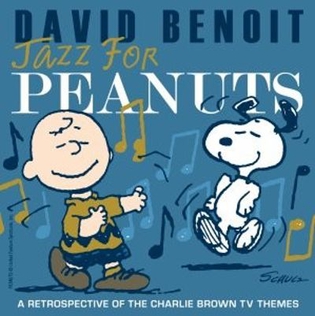
Jazz for Peanuts: A Retrospective of the Charlie Brown TV Themes is a compilation album released in the U.S. by Peak Records in October 2008. The album is credited to David Benoit and contains a mix of previously released material plus newly recorded songs featured in prime-time animated television specials based on the Peanuts comic strip by Charles M. Schulz.
